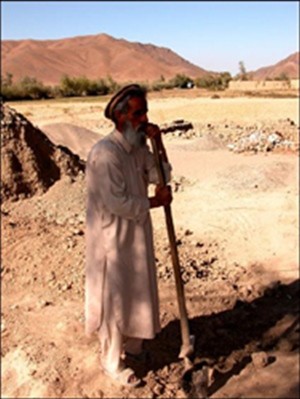
Mohammed Shah, one of five area farmers invested in a shallow well in Logar, pauses to chat while harvesting onions.
Matt Herrick
USAID helps Afghan farmers collaborate and construct improved irrigation systems
1 DECEMBER 2003 | LOGAR PROVINCE
Challenge
In a landlocked country where only 12 percent of the land is arable, irrigating land is limited to three options: canals fed by river and rain, a natural spring, or the ancient underground aquifer known as karez. For the farmer fortunate enough to cultivate a sliver of the available 78,240 hectares of Afghan land, only an estimated 20 to 40 percent of canal-irrigated land was available for harvest in 2002 due to insufficient seed and water for irrigation. “For only two months each year, the canal is full of water from the Pulealam River,” says 45-year-old Mohammed Shah. “That’s ten months without water, including the entire summer.”
Initiative
USAID helped Afghan farmers, like Mohammed Shah, build eight shallow wells for diesel pumps in the Kabul and Logar provinces. Irrigation projects often target farmers without the means to irrigate from canals. However, this particular project in Logar helped a group of five farmers with handicapped canal access, who each wanted to cultivate approximately 2 hectares of land apiece.
The wells themselves are covered cylindrical brick houses enclosed around a spiral staircase that steps into the cold earth one concrete step at a time. Flexible hoses similar to those used by firefighters in the United States connect diesel pumps that suction 500 liters of water per minute to the empty canals above.
The housing structure not only protects the valuable pumps—a collective investment made by the farmers using the well—and helps prevent accidents, but also assures that the water is free from mosquitoes and other disease-carrying insects that thrive in warm, standing water.
Results
Combining their efforts and resources, the farmers excavated and built the structure with engineering guidance from USAID. They have all agreed to share in the startup costs to effectively manage an irrigation schedule that gives each partner a fair share of time and water, and to pitch in on repair costs when the pumps require maintenance.
Mohammed turns his onions in the soil with a shovel and talks with anticipation about the 2004 planting season. “Next year I want to sell my onions to the trucks,” he says, referring to the produce buyers who frequent this area rich with onions, potatoes and corn.







Comment
Make a general inquiry or suggest an improvement.